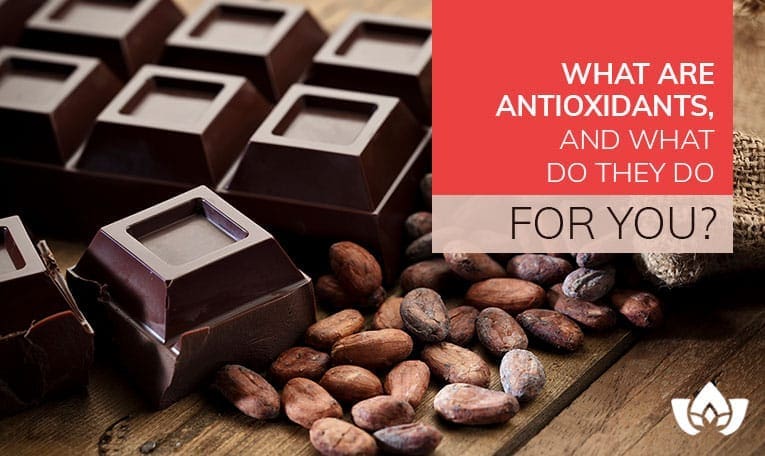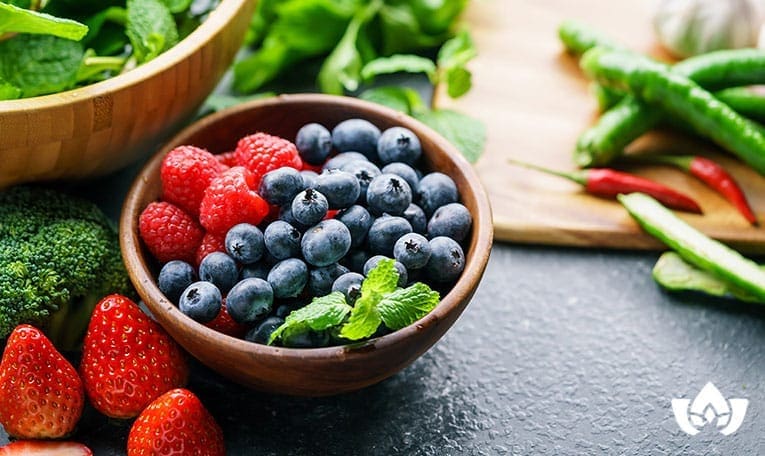
You’ve probably heard of antioxidants.
Often used as a buzzword in the marketing of certain foods and supplements, you likely have an inkling that they’re good for you.
But what exactly do they do?
I’m a naturopathic doctor, and I want to de-mystify antioxidants for you – what they are, what they do, and how to ensure you’re getting enough.
Keep reading to learn more.
What Are Antioxidants?
Antioxidants are molecules which protect your cells against damage from free radicals.
Often found in plant-based foods, as well as a number of vitamins, antioxidants protect against oxidative stress which can lead to ailments such as cancer, heart disease, arthritis, stroke, and respiratory distress, among other things.
What Are Free Radicals?
Free radicals are unstable molecules which attack molecules essential for many bodily functions.
However, this doesn’t mean they are all bad – certain functions rely on free radicals; for instance, they are used by your immune system to fight infection.
When free radicals outnumber antioxidants, however, this can lead to oxidative stress.
Benefits Of Antioxidants
Antioxidants have a wide array of health benefits associated with them.
The biggest one is they reduce the damage caused by oxidative stress.
Other benefits include:
- Promoting blood vessel health
- Protecting against some types of cancer
- Reduction of inflammation
- Promoting heart health
- Promoting prostate health
- Protecting vision and preserving eye health
Important Antioxidants
There are a variety of sources which can provide antioxidants, and they all have slightly different benefits.
Let’s take a look at some important sources of antioxidants.

1. Vitamin C
Vitamin C is a water-soluble nutrient which is found in a variety of plant-based foods.
Some great sources of vitamin C include:
- Berries
- Citrus fruits
- Bell peppers
- Kiwi fruit
Not only is vitamin C an antioxidant, but it can help revive other types of antioxidants which have been attacked by free radicals.
Vitamin C is also known to be effective in managing stress, reducing high blood pressure, and reducing risk of heart disease.
2. Vitamin E
Vitamin E is a fat-soluble antioxidant which limits the production of free radicals.
It has an important role to play in protecting cell membranes from oxidative damage.
Some food-based sources of vitamin E include:
Vitamin E also plays a role in the health of your skin, your immune system, and your kidneys, as well as in the treatment of type 2 diabetes.
3. Flavonoids
Flavonoids are a type of phytonutrients found in plant-based foods.
Benefits of flavonoids include decreased risk of cardiovascular disease, cancer, asthma, and stroke.
Foods which contain flavonoids include:
- Cinnamon
- Parsley
- Green tea
- Capers
- Saffron
- Dill
- Thyme
- Ginkgo biloba
- Garlic
- Ginger
4. Selenium
This powerful antioxidant may help protect against some types of cancer.
It comes in two forms – organic and inorganic, and the body can utilize both of these.
Foods high in selenium include:
- Sardines in oil
- Halibut
- Brazil nuts
- Yellowfin tuna
Selenium is also a useful supplement in naturopathic treatments for Graves’ disease
5. Iron
Iron is a nutrient which helps to protect against cell membrane damage.
There are two types of iron – heme and non-heme.
Heme iron is found in meat-based foods and is easier for the body to absorb than non-heme iron.
Some foods sources of iron include:
- Dark chocolate
- Oysters
- Fortified cereals
- White beans
- Beets
- Apples
Iron is often an important element in the treatment of polycystic ovary syndrome.
6. Other Antioxidants
Some other antioxidants and their sources include:
- Vitamin A (dairy products, eggs)
- Beta-carotene (brightly coloured fruits and vegetables such as carrots, mangos, and spinach)
- Lycopene (pink and red fruits, such as tomatoes or watermelon)
- Lutein (green, leafy vegetables)
- Copper (oysters, black beans, soy protein)
- Manganese (pecans, brown rice, pineapple)
- Zinc (Beef roast, beef patty, fortified cereals, oysters, crab)
Should You Take Antioxidant Supplements?
As with any nutrient, it’s always best to get your intake of antioxidants through diet, rather than supplementation.
Too high of an intake of some antioxidants can actually be harmful, and people who take high-dose supplements are at greater risk of harmful side effects than those who get antioxidants through diet.
Additionally, sometimes they can interfere with medication.
Many antioxidants work best when combined with the other nutrients in the foods they’re found in and aren’t as effective when taken independently.
If you suspect you are low in a specific nutrient, it’s always best to discuss with your doctor or naturopath if supplements are the right choice for you.
Book An Appointment At The Mindful Healing Clinic
Are you confused about nutrition?
Worried you might not be getting enough of the right nutrients?
Not sure if there is a specific diet or eating plan which you should be following?
Do you have a medical conditions which you think is being aggravated by your current diet?
I’m Dr. Maria, and I want to help.
I offer naturopathic nutritional counselling services, with the goal to help the body to repair and heal itself.
Contact me today to set up an appointment, and learn about what naturopathic medicine can do for you.
Until next time,
Dr. Maria Cavallazzi, N.D
Mindful Healing Naturopathic Clinic
Mississauga, ON L5M 1L7
(905) 819-8200
► https://g.page/MindfulClinicNaturopathic
Dr. Maria Cavallazzi is a medical doctor from Colombia where she practiced as a family physician for 8 years until she moved to Canada 16 years ago and became a naturopathic doctor in Mississauga.


